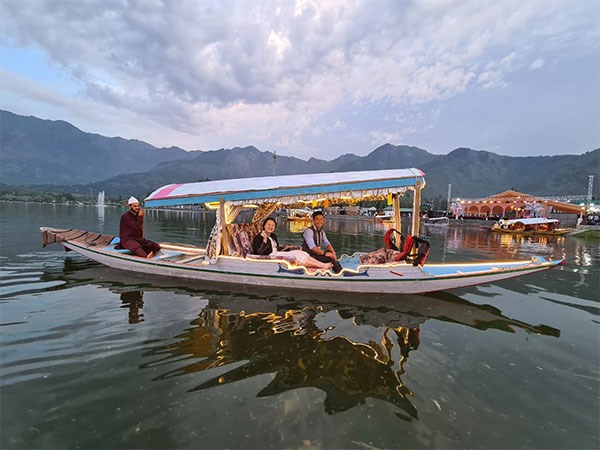G20 delegates from across the world enjoyed a day of sight-seeing – visiting bazaars and soaking in the natural beauty of Jammu and Kashmir (J&K). The international media also showcased the beauty of the north Indian state as well as the stability in the region which had earlier witnessed bloodshed by Pakistan-trained militants from across the border.
#Watch : #G20 delegates enjoy a shikara ride at the world famous Dal Lake.#G20Kashmir #Peace #Tourism @PMOIndia pic.twitter.com/R4WSib0KUB
— Voice for Peace and Justice (NGO) (@farooqganderbal) May 22, 2023
After taking over the presidency of the G20 last year from Indonesia, New Delhi planned events across the country in a bid to showcase the diversity and potential of the country. The three-day G20 Tourism Working Group (TWG) meeting, held in Srinagar from May 22-24, was an effort in that direction.
#G20Kashmir
On the first day of the 3rd #G20 Tourism Working Group Meeting, a #Handicraft #Exhibition held at the lawns of #SKICC in #Srinagar. The #delegates have evinced a keen interest in the exhibits displayed at the #Handicraft Exhibition.#G20 #Peace #Love @PMOIndia pic.twitter.com/JTvVifmp7R— Voice for Peace and Justice (NGO) (@farooqganderbal) May 22, 2023
In Srinagar, tourism delegates from across the world were wooed by Kashmir’s women entrepreneurs who displayed their handicrafts. The delegates were mesmerised by shikara rides on the Dal Lake nestled among the picturesque mountains and were witness to traditional dances and the rich local heritage.
#Kashmir is heaven on earth truly. Attending the #G20 meet on Tourism in Kashmir which has turned into a historic first-ever global event in the valley. Look at the stunning Shikaras on the magnificent Dal Lake. Wishing for peace and prosperity to this land of peace and beauty. pic.twitter.com/vE1iAtGURO
— Ravinder Singh Robin ਰਵਿੰਦਰ ਸਿੰਘ رویندرسنگھ روبن (@rsrobin1) May 22, 2023
Kashmiri youth took the lead in welcoming the delegates by putting up performances of the local arts. The young people in J&K have been taking up sports, cultural activities and imbibing the spirit of entrepreneurship after the state was freed from the shackles of the highly parochial Article 370 in August 2019.
Shankaracharya Hill, Srinagar.
The Shiva temple on top of this hill, 1000 feet above Srinagar city, has gorgeous 360 degree views.
One of the oldest Hindu temples in Kashmir valley, dating back at least 1600 years. It is said that Adi Shankara composed Soundarya Lahari here. pic.twitter.com/ucTBRjIySI
— Kiran Kumar S (@KiranKS) July 20, 2022
For more than a thousand years before the advent of Islam, Kashmir was the seat of Shaivism, Vaishnavism and Buddhism. Capital Srinagar gets its name from ‘Shri Nagara’, meaning ‘auspicious city’ and is linked to Lakshmi, the Goddess of Fortune, says writer Devdutt Pattanaik.
Pok can't compete with us in every aspect. #I_Love_My_India #Kashmir #Tourism #Peace #Love https://t.co/f3HySz4VPk pic.twitter.com/ReNvOlHuFq
— Voice for Peace and Justice (NGO) (@farooqganderbal) May 21, 2023
The partition of India on communal lines, and the Islamist cross-border terrorism promoted by Pakistan, derailed the development of J&K besides poisoning the social fabric of the region. Alarming rise in militancy along with the influx of sophisticated weapons also led to the ethnic cleansing of non-Muslim minorities like Hindus and Sikhs, who were forced to leave their homeland.
The delegates those are arriving at Srinagar to attend the #G20 meeting being welcomed in traditional Kashmiri ways.
Third G20 working group meeting on tourism, takes place in the Sher-e-Kashmir International Convention Centre from May 22 to 24. pic.twitter.com/uCJuaFZEwL
— Ravinder Singh Robin ਰਵਿੰਦਰ ਸਿੰਘ رویندرسنگھ روبن (@rsrobin1) May 22, 2023
For almost the past one year, a politically unstable and economically-deprived Pakistan has led a strident global campaign asking countries not to attend the G20 events in India. Pakistan followed up its campaign with threats and by pumping in heavily-armed men in J&K to attack Indian soldiers, kill Hindu civilians and threaten international delegates from attending the G20 events.
G20 nations are visiting #Kashmir! When are you? Incredible INDIA!🇮🇳 #KashmirWithG20India pic.twitter.com/qJrspbJWbV
— Aditya Raj Kaul (@AdityaRajKaul) May 20, 2023
Eventually, the G20 tourism meeting was boycotted by the two all-weather allies Pakistan and China, both of whom have attacked the Indian region through terror activities and military aggression.
Also read: Pakistan’s social media campaign against G20 Kashmir meetings fizzles out




















